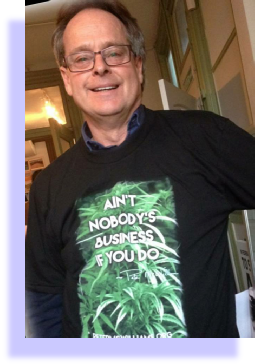Marc Emery
“Peter's book Ain't Nobody's Business If You Do
is one of the most important works on the immoral imposition of laws that punish
normal human behaviour, it is a joy to read, and I discovered something new to add
to my arsenal of knowled ge on every page.”
ge on every page.”
~Marc Emery, 5.17.2011
Prison Blog # 29: The Madness Continues
~Marc Emery, “Prison Blog #29: The Madness Continues’
..an Introd uction by Julia of Peter McWilliams.org
uction by Julia of Peter McWilliams.org
Peter A. McWilliams was an amazing poet, self-publisher, New York Times best-selling
author, advocate of those suffering from depression, and medicinal marijuana activist.
He penned the soothing poetry in "How to Survive the Loss of a Love." He helped disabled
folks learn how to use computers and even dabbled in photography ("Portraits"). He
suffered through his own depression and healed it. Along with co-author Harold Bloomfield,
Peter helped shrink the stigma of depression ("How to Heal Depression") and promote
a natural healing herb, St. John's Wort. Peter churned out many classics including
"LIFE 101," "You Can't Afford the Luxury of a Negative Thought" and the Libertarian
gem, "Ain't Nobody's Business if You Do." In 1996 Peter got really sick, and found
medicinal marijuana was the one thing that kept his medication down. The government
disallowed him the use of medicinal marijuana, and shockingly Peter died way too
soon at the young age of 50 in 2000. Ten years later, "Peter's Page" was born out
of much love. Having only recently discovered "You Can't Afford the Luxury of a Negative
Thought", I felt compelled to help the world remember and discover Peter. ~ petermcwilliams.org
"I’ve been reading ‘Ain’t Nobody’s Business If You Do (The Absurdity of Consensual
Crimes in Our Free Country).’ This is a marvelous book by Peter McWilliams. Peter
was stricken with AIDS in later life and after Proposition 215 was passed in California,
proceeded to participate in a marijuana garden (with Todd McCormick, who spent over
4 years in jail) and was convicted under Federal law for growing marijuana. Peter
used cannabis to stanch the nausea form the cocktail of AIDS medicines his doctors
prescribed him. The Federal judge had forbade Peter from using marijuana for his
nausea, and days later Peter McWilliams died in his bathtub choking to death on his
own vomit. Peter was an author of many books on positive thinking, emotional survival
and personal wealth (titles include ‘How to Survive the Loss of a Love’, ‘You Can't
Afford the Luxury of a Negative Thought’, and ‘Wealth 101’). I decided to re-read
Peter’s great literary contribution to law and philosophy, ‘Ain’t Nobody’s Business
If You Do’ when the online curator of Peter’s legacy (http://www.facebook.com/WeRememberPeter)
sent me a gift copy to inspire me here in jail. The book is truly brilliant and
wonderful, at once straight forward and easy to read, and I’m learning so much; when
you’ve been an advocate for 31 years, sometimes you think you can’t learn anything
new about liberty, only to be proven delightfully wrong.

I found McWilliams’ discussion of relationships illuminating. “The idea behind laws
against consensual activities is that if some people are in a bad relationship with
something, then that thing should be banned. The problem is, that solution doesn’t
solve anything: the problem doesn’t lie with the thing (or substance) itself, but
with some people’s relationship to it. Yes, there are some things with which it is
easier to be in a bad relationship with than others. Cigarettes practically beg for
a bad relationship. But then, they were designed that way. For the several centuries
prior to the Civil War, tobacco’s use was primarily recreational: people would inhale
it, choke, get dizzy, fall on the floor, roll around. For the most part, people used
tobacco (a botanical relative of the deadly nightshade) once or twice a week, and
that was it. After the Civil War, the south needed a cash crop less labor intensive
than cotton. A special strain of tobacco was developed that allowed people to inhale
deeply without coughing. This let people smoke almost continuously if they liked
it. It also resulted in almost immediate addiction. Almost every tobacco smoker is
addicted. While there are many ‘social drinkers’, there are no ‘social smokers’.
Smokers begin from the time they wake up to when they go to sleep… Addiction is a
sure sign of a bad relationship.”
Sex, food, caffeine, gambling, religion, marriage, sports: all of these and virtually
every other substance, activity or opportunity has the potential in all of us to
be a good or a bad (or neutral) relationship.
Halfway through the book I’ve re-learned much about the US Constitution (and how,
tragically, myself being a case in point, the United States has abandoned the Bill
of Rights and other restraints on government), the history and ideas and strengths
in the separation of church and state, and the separation of society and state. Peter
makes it all fun too. I was being educated on every page with what seems like no
effort."


 ge on every page.”
ge on every page.” uction by Julia of Peter McWilliams.org
uction by Julia of Peter McWilliams.org 